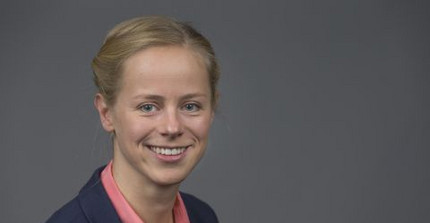Melinda Erdmann
What did you study?
I still studied an old Magister Artium with a major in sociology and a minor in philosophy and business administration. My main subject was mainly empirical social research and social structure analysis. I can now apply this knowledge in my job and continue to develop it.
Where do you work?*
I have been working at the Center for Quality Development in Teaching and Studies at the University of Potsdam for seven years, specifically in the field of university studies. The center's staff support the university with a wide range of offers to ensure and improve the quality of teaching and courses at the university. For example, further training for teachers and advice for students and graduates are offered. In the area of university studies, we are specifically concerned with the development of instruments for quality development based on scientific findings from educational, evaluation and social research. These include, for example, the questionnaires for course evaluation or further surveys of students and other university members. In addition, we design and support complete evaluation processes, such as the appraisal of study programs in the form of internal program accreditation.
How did you get into your job?
I worked here at the center as a student and was hired as a research assistant after graduating.
What were the last three things you did at work?
1. I answered a request I received about a survey.
2. I have cleaned up the data collected from a survey and checked it for plausibility. That means, I looked at the raw data sets from our current survey and prepared them for further evaluations and reports using the SPSS statistics program.
3. Together with colleagues, we have prepared a workshop that will soon be offered for university members.
Do you work in a laboratory?
No, I spend my working hours in my office or in consulting rooms.
Do you have an influence on educational reforms?
In my team, we would very much like our work to have an influence on education policy, but the journey from our work to the formation of education policy is very long. At the center, we sometimes work on fairly university-specific problems, which does not immediately lead to concrete educational reforms. Nevertheless, we have the opportunity to help shape the resolutions of the Brandenburg Ministry of Science and Research by presenting our results and concerns to ‘the politicians’. But of course this does not always and immediately lead to our desired changes. Within the university, our results often trigger desired changes, for example in the revision of courses or of supporting offers at the university.
What's an important finding resulting from your research?
Education equals inequality! It is important for sociological educational research to show which mechanisms lead to inequalities in access to education so that counter-measures can be developed for educational policy.
What challenges do you face in your job?
A recurring task is above all to master the challenges that you had not considered beforehand. I worked on many projects that were very well prepared and well planned, but in each of them there were sometimes unpredictable events or problems that we had to solve quickly. In these situations you have to stay calm and get very creative from time to time in order to find solutions. In addition, I often work in an interdisciplinary manner, i.e. with colleagues from other departments, and thus with different specialist cultures; It is not always easy to combine all the different perspectives in one project.
Your tips for young professionals?
From my point of view, it is important to try out your career while you are still studying. On the one hand, this gives you an initial insight into professional requirements. This can sometimes mean that certain topics of the course, such as statistics or the use of certain software programs, also become much more interesting. And on the other hand, it enables the creation of a social network which can be very helpful in future job searches.
This interview was conducted in April 2017.

